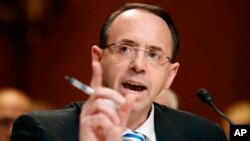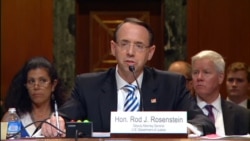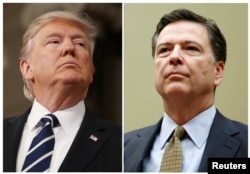A top U.S. Justice Department official assured lawmakers Tuesday that without "good cause" he would ignore any attempt by President Donald Trump to fire a special counsel investigating possible illegal collusion between Trump's aides and Russian officials in last year's campaign.
Deputy Attorney General Rod Rosenstein, who appointed Robert Mueller, a former director of the Federal Bureau of Investigation, to lead the high-profile investigation of Russian meddling in the election aimed at helping Trump win, told a Senate panel he would not comply with any Trump order to fire Mueller absent a compelling reason. He added that no such reason currently exists.
Rosenstein offered his assurances as U.S. news accounts quoted Republican allies of Trump suggesting that the president is considering firing Mueller, whose appointment last month drew widespread praise from both Republicans and opposition Democrats. Now, however, some Republicans are suggesting that Mueller ought to be dismissed, pointing to Mueller's selection of key investigators who made campaign donations to Trump's Democratic challenger, former U.S. Secretary of State Hillary Clinton.
WATCH: Rosenstein on plan to fire Mueller
Republicans, Democrats weigh in
A key Trump supporter, former House of Representatives Speaker Newt Gingrich, said, "Republicans are delusional if they think the special counsel is going to be fair."
However, another Republican, current House Speaker Paul Ryan, told reporters, "I think in the best case for the president is to be vindicated by allowing this investigation to go on fairly and independently. So I think the best advice will be to let Robert Mueller do his job.”
Rosenstein said he was the only Justice Department official who could dismiss Mueller because Attorney General Jeff Sessions recused himself from oversight of the Russian investigation because of his staunch support of Trump during the campaign and later revelations that he had met twice with Russia's ambassador to Washington.
"As long as I'm in this position, he's not going to be fired without good cause," Rosenstein said. "I’m not going to follow any orders unless I believe they are lawful” and that "it wouldn't matter what anybody said."
Democratic Senator Dianne Feinstein of California told Rosenstein, "It would be catastrophic," if Trump fired Mueller.
Rosenstein assured Feinstein the firing of Mueller would not occur without his assent.
"I appointed him and I believe it was the right decision and I'm going to stand by that," Rosenstein said.
Rosenstein's testimony before the Senate Appropriations Committee occurred just hours before Sessions was to testify in a public hearing before another Senate panel about his contacts with Russian Ambassador Sergey Kislyak and his involvement in the firing of another FBI chief, James Comey.
Latest step in multiple investigations
The Senate Intelligence Committee hearing is the latest step in multiple ongoing investigations into Russian meddling in last year's U.S. presidential election.
During his confirmation hearing in January, Sessions said he had not met with any Russians during the campaign. The Justice Department later acknowledged Sessions's contacts with Kislyak but said they were part of Sessions's job at the time as a senator.
His testimony comes less than a week after Comey said during his own appearance before the Senate Intelligence Committee that he felt Trump had violated the normal separation of criminal investigations from White House oversight by urging him to end the investigation into Russia's activities.
Comey said Trump told him he hoped Comey would "let go" of his investigation of the president's first national security adviser, Michael Flynn, and also asked Comey to pledge his personal loyalty and to "lift the cloud" of the Russia probe.
Comey also said the FBI had "additional facts" about Sessions that he could "not discuss in an open setting."
Trump has disputed Comey's account of the conversation about Flynn as inaccurate, although his oldest son, Donald Trump Jr., a frequent defender of his father's White House performance, seemed to confirm the gist of it.
"When he tells you to do something, guess what, there's no ambiguity in it," Trump Jr., speaking of his father, told Fox News on Sunday. "There's no, 'Hey, I'm hoping.' You and I are friends, 'Hey I hope this happens, but you've got to do your job.' That's what he told Comey."
Was Comey conversation taped ?
Before Comey testified, Trump suggested there might be a White House recording of their private dinner, which Comey said he hopes there is. But the president and his aides have not definitively said so. Pressed on the issue Friday, he said, "I'll tell you about that maybe sometime in the very near future."
The White House again Monday refused to say one way or the other whether there was a tape. Republican lawmakers are urging the Trump administration to release the recordings, if they exist.
Trump fired Comey last month. Trump later said he was thinking about "this Russia thing" as he decided to dismiss him because he considered claims that Russian interference in the election influenced it in his favor to be bogus, an excuse by Democrats to account for his stunning upset of Clinton.







